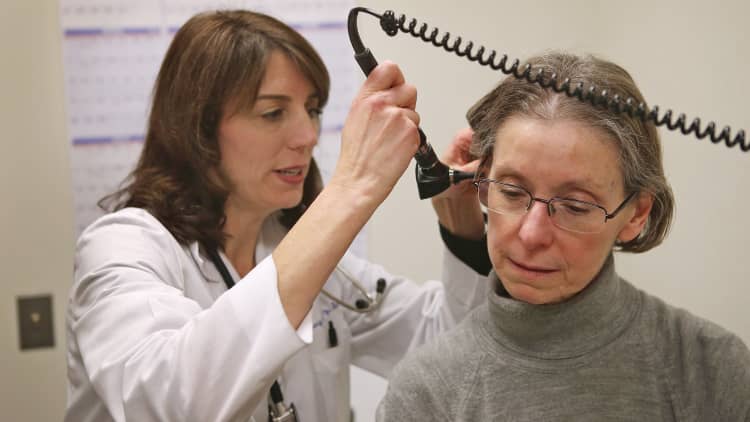
I'd been out of the office for two and half days this week with flu-like symptoms, and decided I couldn't miss another day of work.
But when I dialed into CNBC's morning news call Friday, where flu was an initial topic of discussion, my plans changed.
"I'm coming in!" I croaked down the line.
"NO!" My co-workers yelled back. CNBC's editor-in-chief, Nik Deogun, told me to stay home — advice we should all take when we're sick enough to question whether we should be around others.
But many of us don't.
In fact, 39 percent of us go to work when ill, according to a survey from urgent care provider CityMD.
"The fact that many people with the flu or flu-like symptoms are leaving home to go to the store, work or the ATM and are not taking precautions is creating environments that can infect others and spread what is a very underestimated disease," Dr. David Shih, CityMD's executive vice president of strategy, health and innovation, said at the time.
Flu is especially bad this season. The predominant strain, H3N2, isn't well prevented by the flu vaccine. Dr. Anthony Fauci, director of the National Institute for Allergy and Infectious Diseases, said early estimates put its effectiveness at about 30 percent, versus 60 percent for the flu shot at its best.
And hospital visits from patients with flu-like symptoms have ramped up faster than usual, on pace with the 2012-2013 and 2014-2015 flu seasons. The flu has killed 30 children this season, according to the CDC.
Dr. Colin Bucks at the Stanford Health Care Department of Emergency Medicine, said this flu season appears to him as the worst since the 2009 swine flu pandemic.
"We see some every year, but this year we're getting clobbered," Bucks told CNBC last week.
And going into work, or other places in the community, while we're sick risks spreading flu further.
The Centers for Disease Control and Prevention recommends staying home for at least 24 hours after fever subsides, without the help of fever-reducing medication.
But not all flu comes with fever. And, according to a study released this week, the flu can spread not just through coughing and sneezing, but even through breathing.
But many workers feel they have to show up.
"Some of it is very traditional and even macho," Dr. William Schaffner, a professor in the division of infectious diseases at Vanderbilt University Medical Center, told CNBC in an interview.
He said that as a young resident, in the early 1960s, he once showed up for work with flu. His chief resident took one look at him, he said, and did what my editor in chief did this morning: said stay home.
"I didn't want to let down my colleagues who would have to cover for me," Schaffner recalled. "Doctors don't get sick!"
But they do, and so does everyone else.
"There is a myth that if you wait one or two days, you are no longer contagious," CityMD's Dr. Shih said. "That's not necessarily true. As long as you have symptoms and are exposing germs to your hands or the air, you are contagious."
So, what can we do to help avoid the spread of flu? In addition to staying home (note to self), public health officials also universally recommend getting the flu vaccine.
"Even though it isn't a perfect vaccine, and even though the efficacy isn't as high as we want, any degree of efficacy is better than no degree of efficacy at all," NIAID's Dr. Fauci said. "We still have a lot of flu left that's going to be seen in the future, over the next several weeks to a month or more, so if you are not vaccinated, you should get vaccinated."
- cover coughs and sneezes
- wash hands with soap and water
- avoid touching your eyes, nose and mouth
- clean and disinfect surfaces and objects that may be contaminated
- take antiviral flu medications like Tamiflu if prescribed
Still, many of us will feel compelled to go to work even when we're sick. And this is where employers can step in, according to the Occupational Safety and Health Administration, a unit of the U.S. Department of Labor. It recommends employers create flexible policies that encourage avoiding the office when sick.
Employers and HR managers can also set good examples themselves, according to the Society for Human Resource Management.
"Consider working from home or staying home to recover when you are indeed sick," said Edward Yost, an employee relations expert with SHRM. "When employees try to power through when they are sick, they may actually prolong their recovery time while also exposing colleagues to the sickness."
If managers and supervisors "model this behavior," he said, "employees will follow your lead."
It can be particularly difficult for workers on an hourly wage, Vanderbilt's Dr. Schaffner pointed out.
"Sometimes they don't have very good sick benefits," he said. "They may lose salary, and if they don't show up, you hear anecdotes where they lose the job."
The U.S. could benefit, Schaffner said, from "an all-encompassing sick leave policy for all kinds of employment."
Experience suggests we all could be doing better. A Twitter poll Friday showed 75 percent of almost 400 respondents have gone to work even when they worried they might be contagious — almost twice the figure in CityMD's survey. We've got a lot of work to do.
And to my own co-workers: sorry I almost did that to you today.

